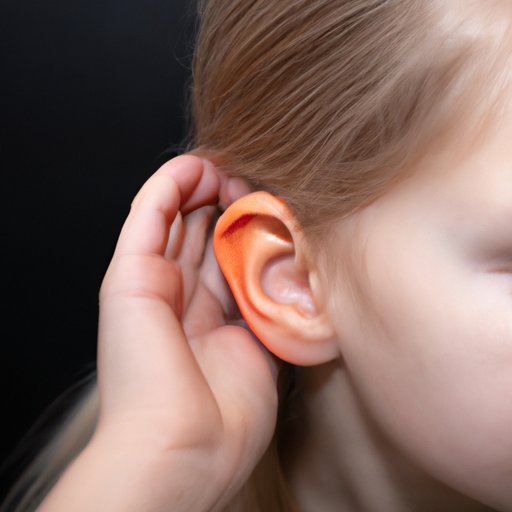
Introduction
Ear pain can be disruptive, uncomfortable and even debilitating. In this article, we will explore the causes of ear pain, home remedies, prevention tips, medical treatment options, and proper ear care. Ear pain may be caused by various factors but all of them require immediate attention to prevent further complications.
The Root Causes of Ear Pain
Ear pain can be caused by a variety of factors, including:
Ear infections
Ear infections occur when bacteria or viruses invade the middle ear. Symptoms of an ear infection include fever, ear pain, trouble hearing, and ear drainage. Ear infections can be painful and are most commonly found in children, but they can also affect adults. It is essential to see a doctor if ear pain and symptoms persist.
Excess wax
Excessive ear wax or cerumen can cause ear pain. Wax buildup is a natural defense mechanism of the body, which traps dirt and dust to prevent it from entering the ear canal. However, when too much wax accumulates, it can cause discomfort or even ear infections. Do not attempt to remove wax buildup with earbuds or cotton swabs, as they can push the wax further into the ear canal.
Pressure changes during flights
During takeoff and landing, pressure in the middle ear can change rapidly, causing discomfort in some people. This is commonly known as “airplane ear.” You may experience symptoms like ear pain, clogged ears, or even hearing loss.
Self-diagnosis techniques
Some people may use self-diagnosis techniques like inserting a foreign object into their ear canals or attempting to drain their ears by ‘burping’ them. These techniques can lead to fatal injuries and are not recommended. Seek medical advice from qualified medical personnel.
Home Remedies for Ear Pain
Many home remedies can help alleviate ear pain, including:
Over-the-counter medications
Over-the-counter (OTC) pain relievers like aspirin, ibuprofen, and acetaminophen can help manage ear pain, but it is best to speak to a doctor before using them.
Natural remedies
Natural remedies can help ease ear pain. These include essential oils like tea tree oil, garlic oil, and olive oil. You can also use warm compresses to reduce pain and inflammation.
Passed down remedies
Several passed down remedies have been used to treat ear pain for generations. Placing a warm chopped onion or garlic into the ear canal or using herbal solutions like mullein oil, St. John’s Wort, and chamomile teas have been said to help ease ear pain. You should consult your doctor before using any home remedies to prevent further complications.
Prevention Tips for Ear Pain
There are several ways to prevent ear pain, including:
Wearing earplugs
Earplugs can help prevent excess noise and water from entering the ear canal, reducing the risk of developing an ear infection or further complications.
Drinking plenty of fluids
Drinking plenty of fluids helps keep the mucous membranes in the ears moist and prevents buildup. Take care when drinking alcohol, as it can cause dehydration, leading to ear pain.
Regular cleaning regime
Establishing a regular cleaning regime, keeping your ears dry, and being careful when using earphones are all essential to prevent ear infections and other ear-related problems.
Suitable for people prone to ear infections
People who are prone to ear infections should speak to their doctors about the best ways to prevent recurrence. Immediate medical attention should be sought at the first sign of ear discomfort or pain.
Medical Options for Ear Pain
Sometimes, home remedies and preventive measures are not enough to manage ear pain, and it is best to seek medical attention. Medical options include:
Seeing a doctor for severe ear pain
Your doctor may prescribe antibiotics or pain killers to alleviate symptoms. They may also clean your ear canal manually, removing excess wax to help alleviate discomfort.
Medication or treatment options available
Your doctor may prescribe medication to help control inflammation and pain. In severe cases, ear surgery may be necessary to alleviate pressure and drainage.
Risks and side effects
The side effects of medication for ear pain may include stomach pain, nausea, vomiting, and dizziness. Ear surgery carries the risk of further complications and infection. Always speak to your doctor about the risks and benefits of medical options.
How to Care for Your Ears
Caring for your ears is critical to prevent complications and discomfort. Some tips include:
Significance of wax buildup
Wax buildup helps prevent dirt and debris from entering the ear canal. However, excess buildup can cause inflammation, hearing loss, and discomfort. Do not attempt to remove wax buildup with cotton swabs or earbuds.
Correct way to clean ears
Use a damp cloth to wipe away excess wax buildup around the outer ear. Do not insert anything into your ear canals. Your doctor can manually remove excess wax.
Frequency of ear cleaning
Establishing a regular cleaning regime helps prevent the buildup of wax, debris, and bacteria which can lead to ear infections and other problems.
Conclusion
There are numerous causes of ear pain, including ear infections, pressure changes during flights, and self-diagnosis. This article has provided home remedies like essential oils and passed down remedies, preventive measures like wearing earplugs and establishing a regular cleaning regime, as well as medical options and proper ear care. You should seek medical assistance if you experience prolonged or severe symptoms and take pride in establishing a regular cleaning regime and preventive measures to maintain ear health.




